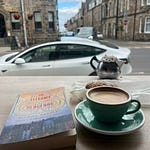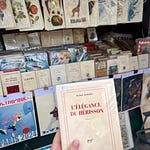Dear Friends,
Happy Tuesday! After an easter break in podcasting, I’m absolutely delighted to bring you a new episode with one of my (if I’m allowed to say this) very favourite guests: Christopher Tin! He has been on Speaking with joy twice before, most recently to speak about his album The Lost Birds. Christopher Tin is a two time grammy award winning composer. He has composed music for film, television, and (perhaps most famously) video games like Civilisation IV. Most recently, Chris was commissioned to compose a new ending to Turandot, Puccini’s final and unfinished opera. It is set to premier on May 11th at the Kennedy Centre.
You can learn more about Christopher Tin at his website.
When Chris and I have a conversation, I never quite know where it will go. In this conversation, for instance, we did talk about the way that both music and metaphor help us express and share our deep, ineffable experiences, and about how different ways of speaking about love informed his compositional approach to Turandot (topics I intended to ask Chris about), but we also somehow ended up talking about Arthuriana and the courtly love and chivalry. I should have known that Chris would share this nerdy interest of mine (and indeed be plotting a large-scale musical piece on it!). But that’s why I love conversations with Chris.
In case you may not know, Turandot is the opera which Giacomo Puccini left unfinished upon his death in 1924. It contains one of the most famous love songs in opera, which you may recognise from the above solo by Pavarotti. However, the story involves some troubling narratives about romantic love, and so part of Chris’ challenge was to think of how to present romantic love in a more holistic, healthy, and modern way. From the sounds of it, he’s done so artfully.
Finally, when I asked Chris if there was a piece that evoked a feeling perfectly for him, he answered that it was Debussy’s Le Mer, about the Ocean. Listen for yourself, and see how it moves you. That’s all for today, friends! Happy Listening.















Share this post